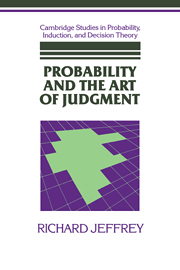Book contents
- Frontmatter
- Contents
- Preface
- 1 Introduction: Radical probabilism (1991)
- 2 Valuation and acceptance of scientific hypotheses (1956)
- 3 Probable knowledge (1968)
- 4 Probability and the art of judgment (1985)
- 5 Bayesianism with a human face (1983)
- 6 Alias Smith and Jones: The testimony of the senses (1987)
- 7 Conditioning, kinematics, and exchangeability (1988)
- 8 Preference among preferences (1974)
- 9 On interpersonal utility theory (1971)
- 10 Remarks on interpersonal utility theory (1974)
- 11 Mises redux (1977)
- 12 Statistical explanation vs. statistical inference (1969)
- 13 New foundations for Bayesian decision theory (1965)
- 14 Frameworks for preference (1974)
- 15 Axiomatizing the logic of decision (1978)
- 16 A note on the kinematics of preference (1977)
10 - Remarks on interpersonal utility theory (1974)
Published online by Cambridge University Press: 05 June 2012
- Frontmatter
- Contents
- Preface
- 1 Introduction: Radical probabilism (1991)
- 2 Valuation and acceptance of scientific hypotheses (1956)
- 3 Probable knowledge (1968)
- 4 Probability and the art of judgment (1985)
- 5 Bayesianism with a human face (1983)
- 6 Alias Smith and Jones: The testimony of the senses (1987)
- 7 Conditioning, kinematics, and exchangeability (1988)
- 8 Preference among preferences (1974)
- 9 On interpersonal utility theory (1971)
- 10 Remarks on interpersonal utility theory (1974)
- 11 Mises redux (1977)
- 12 Statistical explanation vs. statistical inference (1969)
- 13 New foundations for Bayesian decision theory (1965)
- 14 Frameworks for preference (1974)
- 15 Axiomatizing the logic of decision (1978)
- 16 A note on the kinematics of preference (1977)
Summary
AN EXAMPLE OF INTERPERSONAL COMPARISON OF PREFERENCE INTENSITIES
Problem. Shall we open the can of New England clam chowder or the can of tomato soup, for the children's lunch? Adam prefers the chowder; his sister Eve prefers the other. Their preferences conflict. But it is acknowledged between them that Adam finds tomatoes really repulsive, and loves clams, whereas Eve can take clam chowder or leave it alone, but is moderately fond of tomato soup. They agree to have the chowder.
The children are convinced that Adam's preference for clam over tomato exceeds Eve's preference for tomato over clam. Are they right? I think so. I also think that you are not in a position to have an opinion, not having been present at the interaction, and not knowing the children. But I can tell you what makes me think that they have accurately compared the intensities of their preferences; and I expect that when you have heard my reasons, you will go along with my conclusion.
One thing you don't know is whether or not Adam is simply being contrary: whether Adam's expressed loathing for tomatoes and his expressed love for clams are expressions not of his taste in food but of his wish to frustrate his sister. You don't know, but I do, and so does his mother, and his sister. We can assure you that Adam is a genuine clam fan, and that he is genuinely disgusted by tomatoes.
- Type
- Chapter
- Information
- Probability and the Art of Judgment , pp. 182 - 191Publisher: Cambridge University PressPrint publication year: 1992



